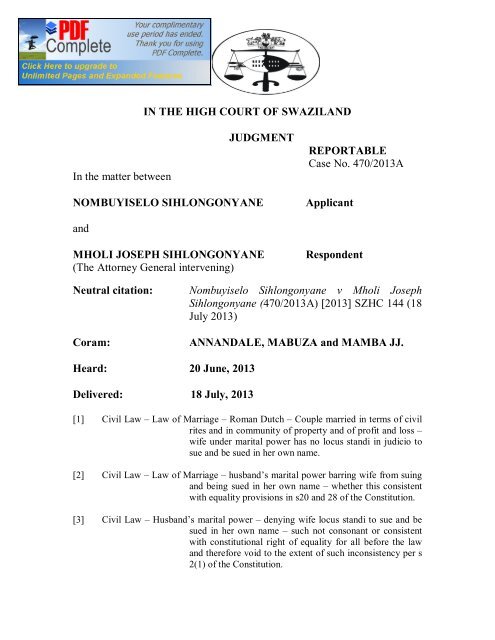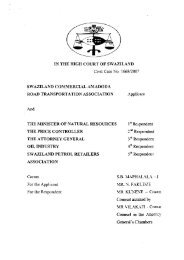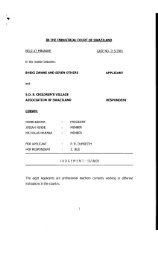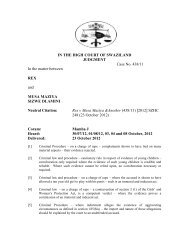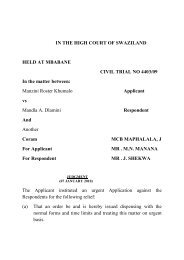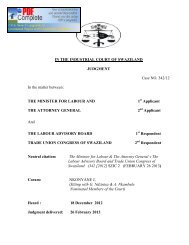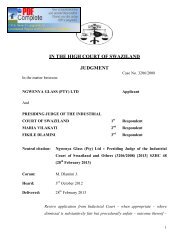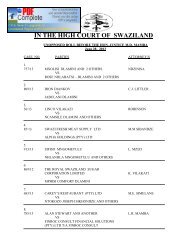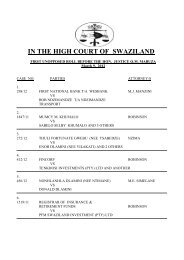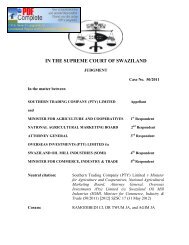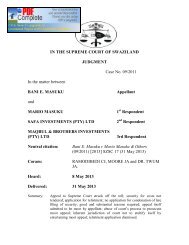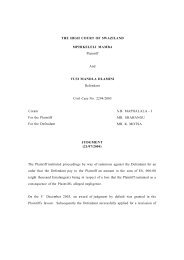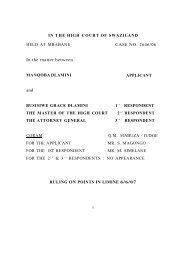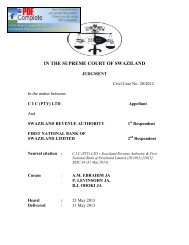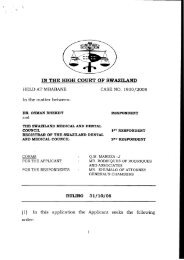Nombuyiselo vs Mholi Joseph Sihlongonyane.pdf - SwaziLII
Nombuyiselo vs Mholi Joseph Sihlongonyane.pdf - SwaziLII
Nombuyiselo vs Mholi Joseph Sihlongonyane.pdf - SwaziLII
You also want an ePaper? Increase the reach of your titles
YUMPU automatically turns print PDFs into web optimized ePapers that Google loves.
IN THE HIGH COURT OF SWAZILANDIn the matter betweenJUDGMENTREPORTABLECase No. 470/2013ANOMBUYISELO SIHLONGONYANEApplicantandMHOLI JOSEPH SIHLONGONYANE(The Attorney General intervening)RespondentNeutral citation:Coram:<strong>Nombuyiselo</strong> <strong>Sihlongonyane</strong> v <strong>Mholi</strong> <strong>Joseph</strong><strong>Sihlongonyane</strong> (470/2013A) [2013] SZHC 144 (18July 2013)ANNANDALE, MABUZA and MAMBA JJ.Heard: 20 June, 2013Delivered: 18 July, 2013[1] Civil Law – Law of Marriage – Roman Dutch – Couple married in terms of civilrites and in community of property and of profit and loss –wife under marital power has no locus standi in judicio tosue and be sued in her own name.[2] Civil Law – Law of Marriage – husband’s marital power barring wife from suingand being sued in her own name – whether this consistentwith equality provisions in s20 and 28 of the Constitution.[3] Civil Law – Husband’s marital power – denying wife locus standi to sue and besued in her own name – such not consonant or consistentwith constitutional right of equality for all before the lawand therefore void to the extent of such inconsistency per s2(1) of the Constitution.
2[4] Constitutional Law and Procedure – declaration of invalidity – to take effect fromdate of filing of application to facilitate smooth transition tonew constitutional order.[5] Constitutional Law – Jurisdiction of the High Court – s 151 (2) – The court isempowered to hear and determine any matter of aConstitutional nature and has jurisdiction to enforce thefundamental human rights in the Constitution.JUDGMENTTHE COURT.[1] The applicant, <strong>Nombuyiselo</strong> Amanda <strong>Sihlongonyane</strong>, is an adultSwazi female and resides in Zakhele. She is a teacher by professionand is currently employed as such at Manzini Central School.[2] The respondent is <strong>Joseph</strong> <strong>Mholi</strong> <strong>Sihlongonyane</strong> and was a pastor atthe Free Evangelical Assemblies Church since 2003 but has sinceestablished a new church known as Kingdom Ambassadors WorshipTabernacle. This church is based in Manzini.[3] The applicant and respondent married each other in terms of civil riteson 11 January 2003 and the marriage is in community of property andstill subsists. The law governing the consequences of the marriage isthe common law.
3[4] The parties have their matrimonial home at Zakhele on the outskirts ofthe city of Manzini.[5] On 25 January 2013, the applicant filed this application on an ex parteand urgent basis seeking inter alia, the following prayers;‘That a rule nisi do issue with immediate and interim effectcalling upon the respondent to show cause on a date to beappointed by this Honourable Court, why an order in thefollowing terms should not be made final:3.1 The respondent causes the following people to leave thematrimonial home with immediate effect;(a) Thokozane Gamedze(b) Thembinkosi Ntjwebe Dube(c) King Siphelele Mkhonta(d) Nhlakanipho Maziya(e) Noncedo Maziya3.2 The respondent does not instruct any other persons to residein the matrimonial home without the consent of the applicant.3.3 Alternatively, the respondent relinquishes his rights andpowers as administrator of the joint estate to the applicant.
43.4 Costs of suit.’[6] The couple is experiencing very serious difficulties in their marriageand this has been going on for sometime.The cause of thesedifficulties, says the applicant, is the respondent’s infidelity. Theapplicant states that the respondent has been involved in adulterousrelationships with a number of women including one Gugu FaithGwebu, with whom he now lives at Sihlahleni area in Ngwane Park,also on the outskirts of Manzini.[7] According to the applicant, the respondent is also guilty of unlawfullyand unilaterally transferring their joint estate to his girlfriends ormistresses. Some of the expenditures by the respondent are unknownto the applicant and these are not to the benefit of the commonhousehold. The applicant avers that the respondent is dissipating anddiminishing the assets of their joint estates and that he is generallymismanaging the estate.[8] When the respondent left the matrimonial home to live at Sihlahleni,he left some of his relatives and members of his church at the parties’
5matrimonial home. (These persons, we believe, are those listed inprayer 3.1 above). Applicant states further that ‘… these individualsare physically and emotionally abusing me and my two children,clearly on the instruction of the respondent. They hail insults at meand my children and the respondent condones their actions.’ Becauseof these abuses, the applicant feels threatened in her own home andnow finds it unsafe for herself and her children to live there togetherwith the said persons. It is for these reasons, that she wants them toleave the matrimonial home.[9] Again, it is in view of the respondent’s alleged maladministration ofthe joint estate that she wants him removed as the administratorthereof and that she be put in charge instead. She avers further thatshe is fully capable and fit to properly administer the said estate.[10] Upon hearing the application, the court (per Maphalala P.J.) grantedthe application and the rule nisi was made returnable on 12 April2013.
6[11] On being served with the rule nisi, the respondent anticipated itsreturn date and filed his opposing affidavit wherein he denied all thealleged acts of infidelity or abuse or the mismanagement andmaladministration of the assets of the joint estate.He explainedfurther that his acts of housing or giving shelter to the personsmentioned above was an act of charity or pastoral obligation on hispart as a minister of religion and this had been explained to theapplicant. He further explained that some of the persons involvedwere his relatives or members of his extended family and he had asocial duty to look after them.[12] We do not think it is either necessary or desirable to give a detailedaccount of the accusations and counter-accusations herein as webelieve that these may be issues suitable for the court or judge thatwill finally hear the matter on its merits. Suffice to say that when thematter appeared before Maphalala PJ on the question of and onwhether or not the applicant as a married woman had locus standi toapply for the reliefs above and in particular that in prayer 3.1 whichinvolves the persons therein mentioned and after hearing both sides onthe preliminary issues, the learned judge observed mero motu that:
7‘…it is my view that the provisions of the SwazilandConstitution (sections 20 and 28) needs to be investigatedthoroughly …whether the old position of the common lawremains or whether the provisionsof the SwazilandConstitution hold sway.’He thus declined to decide this Constitutional question alone and hereferred the matter to the Honourable Chief Justice who then dulyconstituted this court to hear and decide that particular issue. Later,the Attorney General successfully applied to be joined as anintervening party.[13] Section 151 (2) of the Constitution empowers this court to generally,‘hear and determine any matter of a Constitutional nature’ andspecifically, ‘enforce the fundamental human rights and freedomsguaranteed by the Constitution.’ The has wide powers to determinethe nature or type of the appropriate remedy in a given case. (Seesection 35 of the Constitution to which we shall refer presently).[14] Both parties, including the intervening party, made very helpful andcomprehensive heads of argument and submissions before us and the
8court is grateful to them for their industry and sense of duty to thecourt and the legal profession in general.[15] As a starting point, it is perhaps useful and indeed logical inanswering the Constitutional question posed above to first brieflyexamine or restate the common law position regarding the locus standior lack thereof of a woman married in terms of civil rites and incommunity of property to seek the reliefs sought herein.The general principle of our common law is that where the marriage isin community of property, the husband has the marital power unlesssuch power has been specifically excluded by an Ante-NuptialContract or some other act recognized or permissible in law.HR Hahlo, The South African Law of Husband And Wife (5 ed) at 161states that:‘The community of property and profit and loss of the oldregimediffers in important respects from the community ofproperty and profit and loss of the new one. The former islinked with the marital power. By virtue of this power the
9husband administers the joint estate. The wife lacks contractualcapacity as well as locus standi in judicio.’See also PQR Boberg (1977), The Law of Persons and The Family at190 where he states that:‘It is by virtue of the marital power that the husband assumesthe office of administrator of the joint estate, and the wife findsherself subordinated to his guardianship, bereft of active legalcapacity save where common law or statutory dispensationshave been grudgingly granted.The husband’s power toadminister the joint estate as he pleases – buying, sellinginvesting, donating or squandering its assets – is fettered atcommon law only be the rule that transactions in fraud of thewife will be set aside at her instance, and by the remedies ofinterdiction and boedelscheiding (both of which are available insevere cases of maladministration).’ (Footnotes omitted by us.)[16] It is common cause that there are, bar the constitution to which weshall presently refer, no statutory dispensations in our law that haveinterfered with the common law marital power. It is also commoncause that in the instant case, the applicant herein has locus standi in
10judicio based on her allegations in her founding affidavit, to apply forthe relief sought herein as stated in paragraph 5 above, save for thatrelief stated in prayer 3.1 of the notice of motion.[17] One of the key or primary principles of Constitutional adjudication isthat the issue to be determined or question to be answered by the courtmust be a real and factual one and must be between real people ratherthan hypothetical, academic or moot; thus the need to set out thefactual dispute between the parties herein. This principle, we think,has its origin in Ashwander v Tennessee Valley Authority, 297 U.S.288 (1936) where the United States Supreme Court provided the firstclarification or elaboration of the doctrine of ConstitutionalAvoidance. Brandeis J said the doctrine was made up of a series ofseven rules; namely:‘(a)The court will not pass upon the Constitutionality of legislationin a friendly, non-adversary proceeding…(b)The court will not anticipate a question of Constitutional law inadvance of the necessity of deciding it …
12Lomvula Hlophe (On Behalf of Acting Chief Ntsetselelo Maziya vOffice In-Charge, Big Bend Correctional Institution) and 4 Others,Civil Case 2799/08. There is no doubt in our opinion that the rulesapplicable at this stage herein have been satisfied in this application.The matter is not moot. It is real and between real people. Theapplicant has not benefited from her lack of locus standi to sue and besued in her own name due to the marital power and there is no otherground upon which this case may be decided, other than theConstitutional point raised.[19] Quite apart from the Avoidance Doctrine, where a rule of the commonlaw is being challenged as being inconsistent with a Constitutionalprovision, as in this application, the court approaches the issuedifferently from when the challenge is on a statute. As pointed out byMoseneke J in Thebus and Another v S, 2003 (6) SA 505 (CC), this isbecause ‘the common law is its law [and the] courts are protectors andexpounders of the common law [and] have always had an inherentpower to refashion and develop [it] …in order to reflect the changingsocial, moral and economic make-up of society.’
13[20] Section 20 of our Constitution provides that:’20. (1) All persons are equal before and under the law in allspheres of political, economic, social and cultural life and inevery other respect and shall enjoy equal protection of the law.(2) For the avoidance of any doubt, a person shall not bediscriminated against on the grounds of gender, race, colour,ethnic origin, tribe, birth, creed or religion, or social oreconomic standing, political opinion, age or disability.(3) For the purposes of this section, “discriminate” means togive different treatment to different persons attributable only ormainly to their respective descriptions by gender, race, colour,ethnic origin, birth, tribe, creed or religion, or social oreconomic standing, political opinion, age or disability.(4) Subject to the provisions of subsection (5) Parliament shallnot be competent to enact a law that is discriminatory either ofitself or in its effect.’And section 28 stipulates that:’28. (1) Women have the right to equal treatment with men andthat right shall include equal opportunities in political,economic and social activities.’
14[21] Iain Currie et al in their book The Bill of Rights Handbook (3 ed) at182 referring to equality say:‘Equality is a difficult and deeply controversial social ideal. Atits most basic and abstract, the idea of equality is a moral ideathat people who are similarly situated in relevant ways shouldbe treated similarly.Its logical correlative is the idea thatpeople who are not similarly situated should not be treatedalike.For example, it is generally thought wrong to denywomen the vote. This is because, when it comes to voting, menand women are in the same position; they are equally capable ofexercising political choices. So, if men and women are alike,they should be treated alike. At the same time, it is generallynot thought wrong to deny children the vote. This is becausechildren and adults are not in the same position when it comesto their ability to exercise political choices. Because adults andchildren are not alike, a law restricting the franchise to adults istherefore usually thought to be justifiable….[And at 184 theAuthors say] …[f]ormal equality simply requires that allpersons are equal bearers of rights. On this view, inequality is
15an aberration which can be eliminated by extending the samerights and entitlements to all in accordance with the sameneutral norm or standard of measurement.Formal equalitydoes not take actual social and economic disparities betweengroups and individuals into account. Substantive equality, onthe other hand requires an examination of the actual social andeconomic conditions of groups and individuals in order todetermine whether the Constitution’s commitment to equality isbeing upheld.’[22] On unfair discrimination the above learned authors (at 195) state that :‘Unfair discrimination is discrimination with an unfair impact.It has this impact where it imposes burdens on people who hadbeen victims of past patterns of discrimination, such as womenor black people, or where it impairs to a significant extent thefundamental dignity of the complainant.Where thediscriminating law is designed to achieve a worthy andimportant societal goal it may make fair what would otherwisebe unfair discrimination.’
16[23] In examining or determining this application we can do no better thanrepeat what was said by Moore JA in The Attorney General v Mary –Joyce Doo Aphane, Civil Appeal 12/2010 (unreported judgmentdelivered in May 2010) that;‘[4] This case is but the latest in a continuing series brought inmany countries of the world by women in their attempts toaddress what they claim to be discriminatory laws and practiceswhich operated unfairly against women. These precepts andpractices have deprived women of rights which were freelyavailable to men, and kept women in a position of inferiorityand inequality, in the various societies in which they live, work,pay their taxes, and raise their families, despite the fact thatwomen contribute substantially to the growth and developmentof the communities and nations to which they belong. [At 25]…section 28 (1) is a pithy affirmation of women’s rights toequal treatment with men in the activities enumerated there.’[24] Marital power unlawfully and arbitrarily subordinates the wife to thepower of her husband and is therefore unfair and serves no useful orrational purpose. Marital power is unfair discrimination based on sex
17or gender inasmuch as it adversely affects women who havecontracted a specific type of marriage but does not affect the men inthat marriage in the same way, e.g. the inability to sue or be sued intheir own name. In some jurisdictions the marital power has beenspecifically abolished. In South Africa for instance, it was abolishedby Act 88 of 1984 (see H.R. Hahlo ibid) at 17.[25] Whilst it is accepted that in terms of the common law, a marriedwoman who is subject to the marital power may approach the courtfor leave to sue without the aid of her husband – venia agendi – MrVilakati, Counsel for the intervening party, submitted that this verynotion or concept is discriminatory of such women inasmuch as itapplies to such class of women and not men. He referred to it as anabsurdity. A married man does not, under any circumstances, have toapply for such leave. We cannot disagree.[26] The Constitutional provisions quoted above, appear to us to be clearand unequivocal in their meaning and import, and application. Theydecree that all persons or human beings should be treated equally
18before and under the law in all spheres of life and “in every otherrespect and shall enjoy equal protection of the law.”[27] The United Nations Human Rights Committee General comment 28on the Equality of Rights between men and women (2000) states thatthe equality provision‘…implies that all human beings should enjoy the rightsprovided …on an equal basis and in their totality. The fulleffect of this provision is impaired whenever any person isdenied the full and equal enjoyment of any right …[All States]must take steps to remove all obstacles to the equal enjoymentof each such rights. The Committee also notes that inequalityin the enjoyment of rights by women throughout the world isdeeply embedded in tradition, history and culture, includingreligious attitudes. The subordinate role of women in somecountries is illustrated by the high incident of pre-natal sexselection and abortion of female fetuses. States Parties shouldensure that traditional historical religious and cultural attitudesare not used to justify violations of women’s rights to equalitybefore the law and to equal enjoyment of all covenant rights.’
19[28] At paragraph 25 the report states that:‘To fulfill their obligations states must ensure that thematrimonial regime contains equal rights and obligations forboth spouses, with regard to the custody and care of children,the children’s religious and moral educations, the capacity totransmit to children the parent’s nationality, and the ownershipor administration of property, whether common property orproperty in the sole ownership of either spouse. States shouldreview their legislation to ensure that married women haveequal rights in regard to the ownership and administration ofsuch property, where necessary. … Equality during marriageimplies that husband and wife should participate equally inresponsibility and authority within the family.’[29] Our Country is a member of the United Nations and is signatory to therelevant convention or covenant. In enacting sections 20 and 28 ofthe Constitution, the country was fully appreciative or mindful of itsown obligations to its people on this front and also of its internationalobligations under these international instruments.
20[30] We have no doubt that section 20 of the Constitution read togetherwith section 28 gives full effect to our own desires and ethos as anation and also to these international instruments and jurisprudence.It is also plain to us that the marital power of the common law insofaras it prevents married women from suing and being sued without theassistance of their husbands is clearly inconsistent with the provisionsof sections 20 and 28 of our Constitution. The Constitution being theSupreme law of the land, these tenets of the common law mustperforce give way to it.[31] Lastly, as to the appropriate order herein, Mr Vilakati in his heads ofargument submitted that:‘A declaration of invalidity … to the date of coming into effectof the Constitution would have a disruptive effect on legalproceedings instituted in good faith by and against womensubject to the marital power’ before this application. We agree.[32] Our Constitution came into effect on 26 July 2005. Section 35 (2) ofthe Constitution allows the Court to “…make such orders, issue such
21writs and make such directions as it may consider appropriate for thepurpose of enforcing or securing the enforcement of any of theprovisions of this chapter.” The right to equality, of course, fallsunder this chapter, ie, Chapter III. As to what may be an appropriateorder or direction will obviously vary and depend on the peculiarcircumstances of each case.In National Coalition for Gay andLesbian Equality and another v Minister of Justice and others, 1999(1) SA 6 (CC) the court observed that:‘[94] The interest of good government will always be animportant consideration in deciding whether a proposed order…is ‘just and equitable’, for justice and equity must also beevaluated from the perspective of the state and broad interestsof society generally. As in Ntsele’s case, it might ultimately bedecisive as to what is just and equitable. …[95] The present is the first case in which this court has had toconsider the retrospectivity of an order declaring a statutory orcriminal law of offence to be Constitutionally invalid. Theissues involved differ materially from those in cases wherereverse onus provisions have suffered this fate. In the lattercases, an unqualified retrospective operation of the invalidity
22provisions could cause severe dislocation to the administrationof justice and also be unfair to the prosecution who had reliedin good faith on such evidentiary provisions. In addition, thelikely result of such an unqualified order would be numerousappeals with the possibility of proceedings having to be broughtafresh. …[97] An unqualified retrospective order could easily haveundesirable consequences. Persons might act directly under theorder to have convictions set aside without adequate judicialsupervision or institute claims for damages.The leastdisruptive way of giving relief to persons in respect of pastconvictions for consensual sodomy is through the establishedcourt structures. On the strength of the order of constitutionalinvalidity such persons could note an appeal against theirconvictions for consensual sodomy, where the period for notingsuch appeal has not yet expired or, where it has, could bring anapplication for condonation of the late noting of an appeal orthe late application for leave to appeal to a court of competentjurisdiction.In this way effective judicial control can beexercised. Although this might result in cases having to be
23reopened, it will in all probability not cause dislocation of theadministration of justice of any moment.’Bearing these factors in mind, we are of the view that the appropriateorder of invalidity herein must be backdated to the date of filing ofthis application. Such a retrospective order will benefit the applicantin full and all other prospective litigants who are similarly situated asher.[33] For the foregoing, we make the following declaratory order, persection 2 (1) of the Constitution:The common law concept of marital power insofar as and to theextent that it bars married women from suing and being suedwithout the assistance of their husbands is hereby declared to beinconsistent with sections 20 and 28 of our Constitution. Thisinvalidity is with effect from 25 March 2013 from which dateall married women subject to the marital power of theirhusbands shall have the right to sue and to be sued in their ownnames.
24[34] The matter is remitted to the learned Principal Judge who made theoriginal ruling herein for hearing on the merits. All the parties were inagreement that this being a Constitutional matter, the court shouldmake no order as to costs and this is the order we make herein.MAMBA JANNANDALE JMABUZA JFor Applicant:For Respondent:For Intervening Party:Ms. SimelaneMr. SimelaneMr. M. Vilakati


